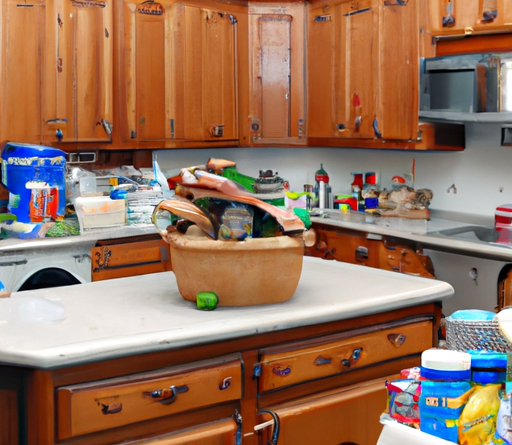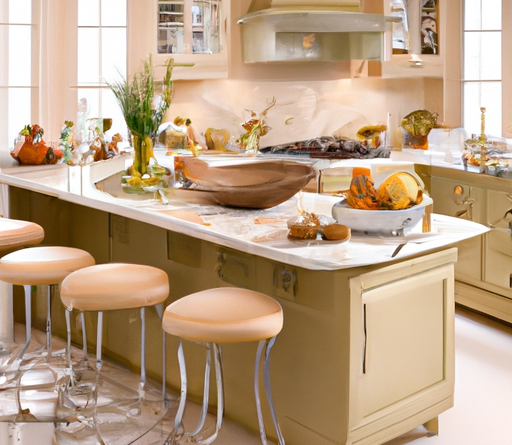Are you tired of the constant buzzing and humming of your kitchen appliances? We understand the frustration of trying to enjoy a peaceful meal or conversation, only to be interrupted by the noise of your blender or refrigerator. Fear not, because in this article, we will share with you some effective tips and tricks to reduce the noise from your kitchen appliances. Say goodbye to the clatter and hello to a quieter cooking experience!
Choose Quiet Appliances
When trying to minimize the noise from kitchen appliances, one of the first things to consider is the noise level of the appliances themselves. Look for appliances that have low dB (decibel) ratings, as this indicates that the appliance operates quietly. Many appliances have this information included in their specifications, so be sure to check for it when making a purchase. By choosing appliances with lower dB ratings, you can significantly reduce the noise levels in your kitchen.
In addition to dB ratings, it’s also important to consider appliances with noise reduction features. Some manufacturers specifically design their appliances to be quieter by incorporating technologies that dampen vibrations and reduce noise. These features can include insulated panels, acoustic padding, and rubberized components. By opting for appliances with these noise reduction features, you can enjoy a quieter kitchen environment.
Proper Placement
Where you place your kitchen appliances can also have a significant impact on noise levels. When selecting the location for your appliances, it’s important to keep them away from sleeping areas, such as bedrooms or family rooms. This ensures that the noise generated by the appliances does not disrupt anyone’s sleep or quiet time.
Another way to minimize noise is by using soundproofing materials. These materials can be applied to the walls or cabinets surrounding the appliances to help absorb and reduce noise. Installing soundproofing materials not only helps to keep the noise levels down, but it also adds an extra layer of insulation to your kitchen, making it more energy-efficient.
Maintain and Clean Regularly
Regular maintenance and cleaning are essential for keeping your kitchen appliances running smoothly and quietly. One of the first things to do is to inspect your appliances for any loose parts. Over time, vibrations can loosen bolts or screws, causing appliances to rattle or produce additional noise. By tightening these loose parts, you can eliminate or reduce the noise caused by the appliance.
Cleaning and lubricating the moving components of your appliances is also crucial for noise reduction. Dust, debris, and lack of lubrication can lead to increased friction, causing louder operation. It’s important to clean the moving parts regularly using appropriate cleaning products recommended by the manufacturer. Additionally, applying a small amount of lubricant to hinges, motors, and other moving components can help reduce noise and prolong the life of your appliances.
Upgrade Insulation
Upgrading the insulation in your kitchen is another effective way to reduce noise from kitchen appliances. Installing acoustic pads behind or underneath appliances can absorb vibrations and dampen noise. These specially designed pads prevent vibrations from transferring to the surrounding structures, resulting in a quieter kitchen environment.
Another option is to add extra insulation to the walls surrounding your appliances. By increasing insulation, you can block out more noise and create a more soundproof environment. This can be done by adding additional layers of insulation, such as foam panels or soundproof drywall, to the walls.
Modify Ventilation System
Kitchen appliances, such as range hoods or exhaust fans, can contribute significantly to the noise levels in your kitchen. To reduce this noise, consider installing silencers in your ventilation system. Silencers are specifically designed to absorb and reduce the noise created by the airflow. By incorporating these silencers into your ventilation system, you can minimize the noise produced by your kitchen appliances.
Additionally, using duct insulation can further reduce noise. By insulating the ductwork, you can prevent the noise generated by airflow from vibrating through the ducts and into your kitchen. Duct insulation materials are readily available and can be easily installed by wrapping them around the ducts.
Use Anti-vibration Pads
Using anti-vibration pads is an effective way to reduce noise from kitchen appliances that tend to vibrate, such as washing machines, dishwashers, or refrigerators. These pads are placed under the appliances and help absorb vibrations, preventing them from transferring to the floor and causing noise.
When selecting anti-vibration pads, consider materials such as silicone or rubber, which provide excellent vibration absorption properties. These materials effectively dampen the vibrations and can make a noticeable difference in reducing the noise levels in your kitchen.
Check for Loose Pipes
Loose pipes in your kitchen can create rattling and banging noises when water flows through them. To address this issue, it’s essential to check for any loose connections and tighten them. By ensuring that all pipes are properly secured, you can eliminate the source of the noise.
Furthermore, insulating the pipes can help reduce noise. Pipe insulation materials, such as foam sleeves or pipe wraps, can be installed around the pipes to prevent them from vibrating and producing noise. By insulating the pipes, you not only reduce the noise levels but also help improve the overall efficiency of your plumbing system.
Consider Sound-absorbing Furniture
In addition to making adjustments to your appliances and ventilation system, incorporating sound-absorbing furniture can further reduce noise levels in your kitchen. Rugs or mats placed strategically on the floor can help dampen the noise caused by foot traffic or moving chairs. These soft surfaces absorb sound waves, reducing echo and overall noise levels in the room.
Installing soundproof curtains on windows or glass doors can also be beneficial in minimizing noise. These curtains are designed to absorb and block sound waves, preventing them from entering or exiting the kitchen. By hanging soundproof curtains, you can create a quieter space and maintain privacy within the kitchen.
Regularly Maintain Refrigerator
The refrigerator is one of the most frequently used kitchen appliances and can generate significant noise if not properly maintained. Regular maintenance is crucial to reduce noise levels and ensure the smooth operation of your refrigerator.
Cleaning the condenser coils is an important maintenance task that helps keep your refrigerator running quietly. Over time, dust and debris can accumulate on the condenser coils, causing the compressor to work harder and generate more noise. Regularly vacuuming or brushing off the coils can improve the efficiency of the refrigerator and reduce noise levels.
Another maintenance task to consider is checking the door seals. A loose or damaged door seal can cause air leaks, making the refrigerator work harder to maintain the desired temperature. This increased workload can result in louder operation. Ensure that the door seal is tight and in good condition to minimize noise and conserve energy.
Use Soundproof Doors
To further enhance the soundproofing of your kitchen, consider using soundproof doors. Ordinary doors may let sound pass through easily, but soundproof doors are designed with materials and construction techniques that minimize sound transmission.
To improve the soundproofing capabilities of your existing doors, weatherstripping can be applied. Weatherstripping seals the gaps around the door, preventing noise from leaking in or out. Another effective measure is installing door sweeps at the bottom of the door. Door sweeps provide an extra barrier, preventing sound waves from passing through the gap between the door and the floor.
By incorporating soundproof doors or improving the soundproofing of existing doors, you can significantly reduce noise levels and create a quieter kitchen space.
In conclusion, there are various methods and strategies that can be utilized to reduce noise from kitchen appliances. From selecting quiet appliances and proper placement to regular maintenance and soundproofing measures, these steps can help create a more peaceful and enjoyable kitchen environment. By implementing these techniques, you can minimize noise, improve comfort, and create a space where you can cook, socialize, and relax without unwanted disruptions.









